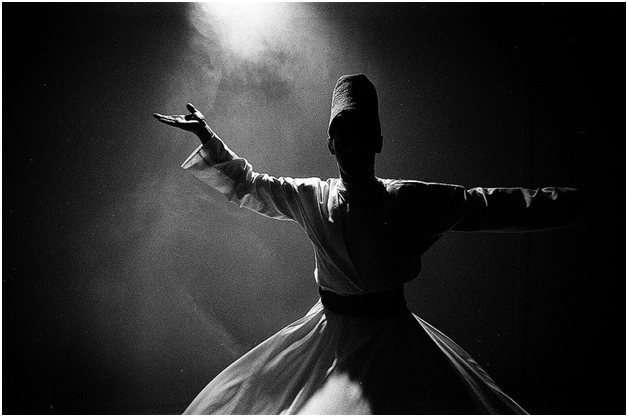Sufism: Love in Times of Hate
The Unbounded Sufi Spirit
Muslim Sufis have shown it was possible to practice Islam with a great deal of accommodation, appropriation and inclusion, and wherever Islam went with the Sufis, through the middle ages, it got embedded in the local social and cultural milieu.
Sufis spoke Punjabi in Punjab, Hindi in Hindustan, Bengali in Bengal and so on and so forth. They spoke in the idiom of yogis, sanyasis and sadhus, often wore saffron clothes or green as an ancient Indian colour of love; they mostly kept fast, even adopted vegetarianism, and attracted a large number of non-Muslim followers, through charitable endeavours, without seeking formal conversion to Islam.
The custodians of one true Islam have undone the good image that the Sufis had built about Islam as an inclusive spiritual practice. The forbidding image of Islam we are now left with is dominated by terror and bloodshed. The Quranic injunction, ‘To you, your religion and to me mine’, a proposition clearly recommending tolerance for difference, no longer sounds credible. Was this tolerance meant only for a politically-neutral kind of context?
Following a narrow interpretation of Sunni Islam, whether of the Hanafi school of jurisprudence or of a more radical Wahhabi kind in later times and related offshoots, bigots have gone berserk, attempting to use or capture political power to force a particular view of the shari’at – customary Islamic practices with some claims of legality or valid law referred to in modern times as the Muslim personal law.
The activism, indeed over-activism, of these guardians of Islam has created a sense of separatism and sentiments of distaste and even dislike for Islam, besides unleashing sectarian difficulties within Islam. The Saudi hatred for Shia Islam is integral to many of the problems in West Asia at present. The most regressive Saudi regime has remained the closest ally of the American foreign policy hawks, who are otherwise self-appointed custodians of democratic practices all over the world. The two along with an aggressive Israeli state formed a troika of strange bedfellows.
Back in medieval times, Muslim rulers did use religious symbols in justification of violent conquests and for the purpose of legitimacy, but they distanced themselves from religious restrictions and discrimination in matters of governance and justice. Refusing to use force to convert the subject population to Islam, the rulers created conditions for the formation of pluralistic societies as in the case of the Delhi Sultanate and Mughal India.
Early 13th century, Sultan Shams-ud-Din Iltutmish famously told a delegation of politically naïve ulama, or Muslim religious leaders, that Muslims were like the salt in food, perhaps both in terms of quality and quantity, and it would be a flawed strategy to disturb the equilibrium – just as the self-appointed spokespersons of a considerably reasonable majority Hindu population are now trying to do by continuously disturbing a small minority population; the violence against the miniscule Christian community has absolutely no justification or rationale whatsoever, even if the missions worked with the explicit agenda of spreading the message of Christ.
In some of the narratives of the politically hostile kind, medieval Sufi figures have also been confused as missionaries attempting to spread Islam in a surreptitious manner. While it is true that Islam spread in regions wherever the Sufis travelled and settled down, but, as scholars such as Richard Eaton and Carl Ernst among others have shown, they were not working as part of an organized mission to convert non-Muslims and bring them to the old fold of Islam. While the Sufis were happy with the recognition of the superiority of their spiritual practices, they generally abhorred the use of political power for forcible conversion. Instead, Sufis presented a more humane face of Islam and made themselves relevant to divergent social contexts through their austerity, spiritual practices, tolerance for other people’s views, charity, blessings and benediction, belief in supernatural ability to perform miracles for public good, and speaking in the language of the masses – not necessarily in theological Arabic, or in political Persian.
These crucial aspects of Sufism across lineages have made Sufis popular, commanding respect even in times of hatred, for they spoke of love as the cardinal principle of a compassionate human life, which is best expressed through music or qawwali. This is above all the little boundaries that the politicians have sought to build around unsuspecting communities of people and pitting them against one another. And, as the Sufi poet proclaimed: kushtagane khanjare taslim ra, har zaman az ghayb jaaniye digar ast (the victims of the dagger of submission get a new life from the Unseen, every moment).





